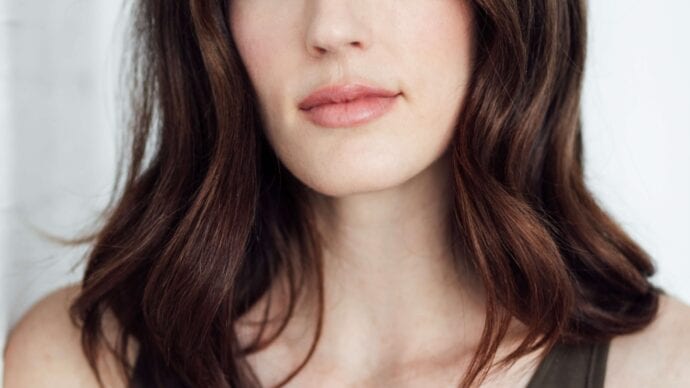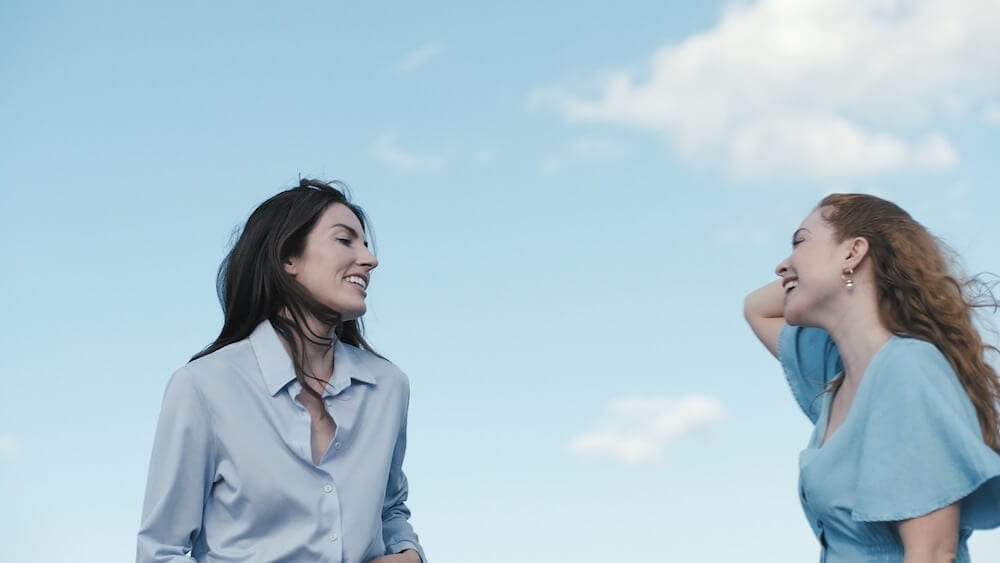I can’t remember the first bisexual character I saw onscreen. That lack of bi and pansexual representation was, in part, what delayed my coming out; I didn’t even know “bisexual” was a label until my 20s. So I’m not totally surprised that, when I ask actor, writer and filmmaker Jessica Huras who some of her favourite bisexual characters are, she also draws a blank. “Can we come back to that one?” she asks over our Zoom video call. And so we do. Huras is the creator and star of a new comedic short, BING! BANG! BI!, currently screening at San Francisco’s Frameline International LGBTQ2+ Film Festival and later this fall at Toronto’s Inside Out Film Festival. As the title alludes, the film tackles bi representation through the story of struggling actor Morgan (Huras) who, arriving in her hometown of Toronto for an unusual gig, takes an ill-timed stance on bisexuality. “As my first film, it felt important to explore a subject that is not only personal, but one that also feels largely misrepresented, if at all,” says Huras. “When I came out dating a woman after having dated men my whole life, I was relieved my family accepted the news. However, when I attempted to further explain myself by saying, ‘But I’m still attracted to men, too,’ a confused and uncomfortable look crossed their faces.” The lack of understanding around bi and pan identities may be surprising considering bisexual people reportedly make up more than 50 percent of the LGB community, according to a 2016 study by the Movement Advancement Project. However, that same study found that both straight and gay people expressed biases towards bisexuals, which often results in further confusion about bisexuality and discrimination. And many of those biases find their way into bi representation in pop culture, when we appear at all. “I think it has to do with not being taken seriously. Bisexuals haven’t been given the same space or consideration that the other identities within the spectrum have,” Huras says. Ahead of BING! BANG! BI!’s Canadian premiere this fall, I spoke to Huras about fighting stereotypes and bi-erasure, why it’s good to be queer in Canada and, yes, her favourite bi characters.

Credit: Courtesy Jessica Huras
BING! BANG! BI! feels very personal. How much of it is autobiographical, and what inspired you to write the film?
I wasn’t very vocal about my identity at all up until this point. I’ve been partnered with a woman for the last 10 years, but previous to that relationship, I dated men. So there were a lot of assumptions that I was now a lesbian, which I didn’t really challenge much, but which also never felt truthful to me. When I started writing this, it became clear that I suddenly had a lot to say about what I had swept under the rug over the years. These comments that I had let roll off my back were suddenly all firing. I was surprised at how easy it was to write in that regard.
The film is peppered with comments alluding to well-worn tropes about bisexuality. At one point, Morgan is called a “lesbian tourist,” and in other scene someone says, “I thought all girls were bisexual.”
That one comment about all girls being bisexual actually came from my best friend, on whom that character is based. We were talking about my script and he just said it off the cuff, and I thought it was perfect. I think our society has a hard time accepting something that isn’t definitive. At the start of my relationship with a woman, who happened to be a well-known lesbian in Toronto’s queer community, I felt judgement and speculation as if I had to prove myself and my commitment in some way. I got a lot of, “Are you for real?” It wasn’t the warmest welcome into the community.
“There’s a whole canon of gay and lesbian film. I’m not aware of one for bi cinema”
What about pushback from your straight friends and family? How did they react to your bisexuality?
My family was pretty great about it all, and I feel very lucky. Everyone was very accepting that I was partnered with a woman, but when I was like, “Oh, I still like men, too,” that was very confusing to my aunt. I thought I was softening the blow—and also it was the truth—but that made me think maybe it was just easier if I said I was gay.
Morgan isn’t the only bisexual in the film. Her best friend Sofia (Sofia Banzhaf) also identifies as bi, and though she’s partnered with a woman, she tries to downplay her attraction to men. Why is that?
It’s something I’ve observed: A bi woman can feel like a threat to a partner who is lesbian-identifying, and thus almost closets her bisexuality. I experienced that at certain points because I felt like my bisexuality made other people uncomfortable—even people who are queer. Morgan’s at this intersection where everything else isn’t going well, and we catch her at this brazen moment in her life. In contrast, Sofia is someone who’s maybe still struggling with that confidence to be truly out.
The film is very obviously set in Toronto. Do you think there’s something unique about living in Toronto as queer people?
My partner and I lived in Austin, Texas, which is a liberal city within a red state. They have a pretty active queer community, but it’s contained to a street downtown and it doesn’t feel so integrated. If we went outside the city of Austin, what we take for granted in Toronto as queer women—feeling so comfortable and safe—became more apparent because it didn’t feel the same.
“I hope that viewers have more of a window into the bi experience—and realize that it is an experience”
I often like to assume that everyone is bisexual, or at least has the potential to be, which maybe makes us less obvious as characters on screen. Do you think bisexuality is underrepresented in film and TV?
When it became clear that my script was going to be about a bi character, I was painfully aware that I hadn’t seen a lot of bi representation in film at all. I was familiar with Desiree Akhavan’s first feature, Appropriate Behavior, and I know her show, The Bisexual, so I knew there was one filmmaker currently spearheading conversations around it. That was very cool, but that’s one person. There’s a whole canon of gay and lesbian film. I’m not aware of one for bi cinema.
Who are your favourite bi characters? (And if not definitively bi, then queer characters?)
I love the characters of Rue (Zendaya) and Jules (Hunter Schafer) in Euphoria. Noémie Merlant and Adèle Haenel in Portrait of a Lady on Fire. Mishel Prada in the series Vida, Kwame (Paapa Essiedu) in I May Destroy You and Sophia (Laverne Cox) in Orange is the New Black are also brilliant.
I’d add Morgan in BING! BANG! BI! to my list! What do you hope audiences will take from watching your film?
For people who can relate, that’s great! But obviously my whole audience isn’t going to relate to being bi or pan, but maybe it’ll challenge some assumptions they have. I hope that they have more of a window into the bi experience and realize that it is an experience. A lot of people just aren’t aware that it’s an identity at all, and it has a rightful place amongst how everyone else identifies.


 Why you can trust Xtra
Why you can trust Xtra


